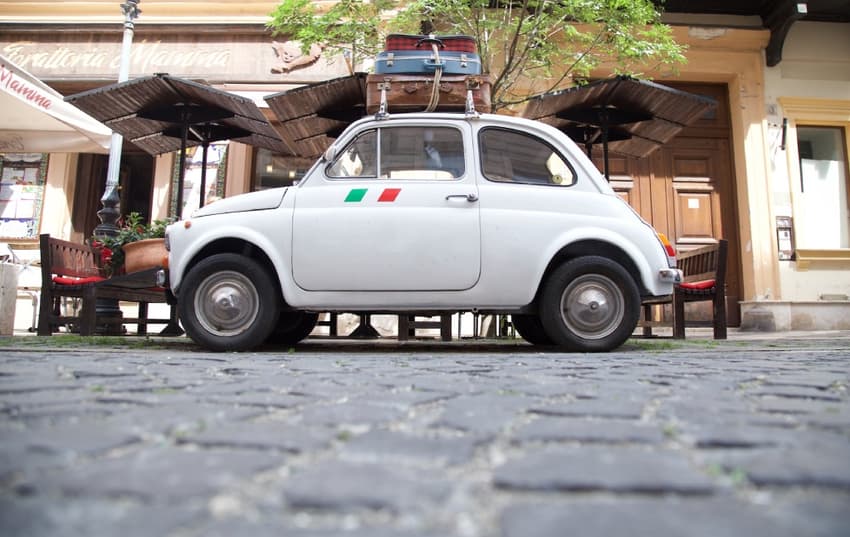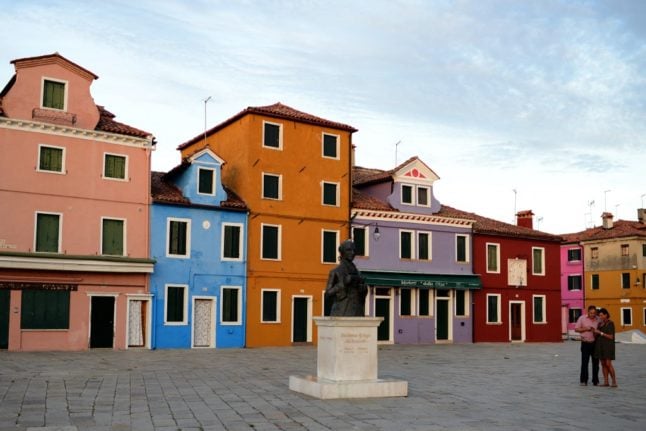Five things EU nationals should know before moving to Italy

Moving to Italy is relatively easy if you’re from an EU country, but there are still some things you’ll need to be prepared for.
If you’re coming from a country within the European Union, a move to Italy is overall much simpler than it would be for non-EU nationals.
But relocating still comes with its challenges - and with a few pieces of Italian paperwork.
Here are five essential things that you should know as you plan your move.
No visa required but you’ll have to register your residence
All EU citizens enjoy freedom of movement within the Union, meaning that you won’t need a visa to enter Italy.
However, if you’re planning on staying in the country for longer than three months, you’ll have to apply for a certificato di residenza (residence certificate) at your local Anagrafe (Registry Office).
READ ALSO: How to register with the anagrafe in Italy
Besides your application form (which may not always be available in English), you’ll be asked to submit a number of additional documents, including evidence of employment, study or training in Italy, or proof that you have sufficient economic means to support yourself and any dependents.
A full list of the documents you’ll be required to produce is available here.
Overall application costs generally amount to just over 30 euros. The residence certificate has five-year validity from the date of issue.
You’ll need an Italian codice fiscale
Though it literally translates to ‘tax code’, the Italian codice fiscale isn’t used for employment or tax purposes alone.
In fact, you’ll need it to complete a range of tasks and activities, from opening a bank account to buying or renting property to making some online purchases.
READ ALSO: Codice fiscale: How to get your Italian tax code (and why you need one)
You’ll be able to apply for an Italian tax code at your local Agenzie delle Entrate (Revenue Agency) office. You can find your nearest office here.
 EU nationals planning on staying in Italy for more than three months must register their residence with the Anagrafe. Photo by Gabriel BOUYS / AFP
EU nationals planning on staying in Italy for more than three months must register their residence with the Anagrafe. Photo by Gabriel BOUYS / AFP
Along with the application form, you’ll be asked to show a valid identification document (identity card or passport).
You should be assigned your code immediately at the office if you're applying in person.
A plastic card carrying the same information will be posted a few weeks later to the address you gave on the application form.
Getting a codice fiscale is completely free of charge. Find a full guide to getting yours here.
No need to exchange your driving licence – until it expires
EU nationals can use their home country licence to legally drive on Italian roads and are under no requirement to exchange it for an Italian one until it expires.
When your foreign-issued licence expires, you’ll have to convert it to an Italian one, but you won’t be asked to retake the driving test.
You’ll have to undergo a health checkup (visita di idoneita’ psicofisica) from an authorised doctor, after which you’ll be issued a medical certificate.
You’ll then have to attach this to your licence conversion request, which must be submitted at your local Ufficio Motorizzazione (Motor Licensing Office). You can find the nearest Ufficio Motorizzazione here.
Converting your licence will set you back 32 euros in administrative costs plus the cost of your checkup, which varies from region to region but is generally between 60 and 90 euros.
Further info on the process and required documents can be found here.
Bringing your vehicle
You’ll be able to bring your vehicle to Italy but you’ll have to register it with the Motor Licensing Office (Ufficio Motorizzazione) and Public Vehicle Registry (Pubblico Registro Automobilistico) within three months of registering your residence.
READ ALSO: How to import your car or motorbike to Italy
In fully Italian fashion, registration involves plenty of paperwork. A full list of required documents is available here.
It’s worth noting that you won’t be able to register your vehicle without a codice fiscale.
Once you’ve successfully completed the registration process – this generally costs around 100 euros – you’ll receive Italian licence plates and a carta di circolazione (registration certificate), which you’ll have to carry with you at all times.
See a full guide to the process here.
Registering with the national healthcare system
If you’re going to stay in Italy for less than three months, you won’t be able to register with the country’s Sistema Sanitario Nazionale (SSN).
However, your European Health Insurance Card (EHIC) will give you access to the same services enjoyed by Italian nationals (free access to GPs and emergency care, and discounted access to specialist consultations, diagnostic exams and non-urgent procedures) during your stay.

EU nationals planning on staying in Italy for more than three months have the right to register with the country's public healthcare system. Photo by Pascal POCHARD-CASABIANCA / AFP
That said, if you’re planning on a longer stay, you’ll have the right to register with the SSN.
READ ALSO: Who can register for national healthcare in Italy?
Registration is totally free for some categories, including people with a valid work contract from an Italian employer and self-employed people (i.e. partita IVA holders). You can find a full list of categories entitled to free registration here.
Anyone who doesn't qualify for free registration (for instance, students) can also opt in to the Italian health service, though they’ll have to pay an annual registration fee.
The fee will be calculated by your local health authority (ASL) based on your financial means, with the minimum imposable fee being 387.34 euros.
After registering, you’ll receive the Italian health card (tessera sanitaria), which will give you access to the same services available to Italian nationals.
Comments
See Also
If you’re coming from a country within the European Union, a move to Italy is overall much simpler than it would be for non-EU nationals.
But relocating still comes with its challenges - and with a few pieces of Italian paperwork.
Here are five essential things that you should know as you plan your move.
No visa required but you’ll have to register your residence
All EU citizens enjoy freedom of movement within the Union, meaning that you won’t need a visa to enter Italy.
However, if you’re planning on staying in the country for longer than three months, you’ll have to apply for a certificato di residenza (residence certificate) at your local Anagrafe (Registry Office).
READ ALSO: How to register with the anagrafe in Italy
Besides your application form (which may not always be available in English), you’ll be asked to submit a number of additional documents, including evidence of employment, study or training in Italy, or proof that you have sufficient economic means to support yourself and any dependents.
A full list of the documents you’ll be required to produce is available here.
Overall application costs generally amount to just over 30 euros. The residence certificate has five-year validity from the date of issue.
Though it literally translates to ‘tax code’, the Italian codice fiscale isn’t used for employment or tax purposes alone.
In fact, you’ll need it to complete a range of tasks and activities, from opening a bank account to buying or renting property to making some online purchases.
READ ALSO: Codice fiscale: How to get your Italian tax code (and why you need one)
You’ll be able to apply for an Italian tax code at your local Agenzie delle Entrate (Revenue Agency) office. You can find your nearest office here.

Along with the application form, you’ll be asked to show a valid identification document (identity card or passport).
You should be assigned your code immediately at the office if you're applying in person.
A plastic card carrying the same information will be posted a few weeks later to the address you gave on the application form.
Getting a codice fiscale is completely free of charge. Find a full guide to getting yours here.
No need to exchange your driving licence – until it expires
EU nationals can use their home country licence to legally drive on Italian roads and are under no requirement to exchange it for an Italian one until it expires.
When your foreign-issued licence expires, you’ll have to convert it to an Italian one, but you won’t be asked to retake the driving test.
You’ll have to undergo a health checkup (visita di idoneita’ psicofisica) from an authorised doctor, after which you’ll be issued a medical certificate.
You’ll then have to attach this to your licence conversion request, which must be submitted at your local Ufficio Motorizzazione (Motor Licensing Office). You can find the nearest Ufficio Motorizzazione here.
Converting your licence will set you back 32 euros in administrative costs plus the cost of your checkup, which varies from region to region but is generally between 60 and 90 euros.
Further info on the process and required documents can be found here.
Bringing your vehicle
You’ll be able to bring your vehicle to Italy but you’ll have to register it with the Motor Licensing Office (Ufficio Motorizzazione) and Public Vehicle Registry (Pubblico Registro Automobilistico) within three months of registering your residence.
READ ALSO: How to import your car or motorbike to Italy
In fully Italian fashion, registration involves plenty of paperwork. A full list of required documents is available here.
It’s worth noting that you won’t be able to register your vehicle without a codice fiscale.
Once you’ve successfully completed the registration process – this generally costs around 100 euros – you’ll receive Italian licence plates and a carta di circolazione (registration certificate), which you’ll have to carry with you at all times.
See a full guide to the process here.
Registering with the national healthcare system
If you’re going to stay in Italy for less than three months, you won’t be able to register with the country’s Sistema Sanitario Nazionale (SSN).
However, your European Health Insurance Card (EHIC) will give you access to the same services enjoyed by Italian nationals (free access to GPs and emergency care, and discounted access to specialist consultations, diagnostic exams and non-urgent procedures) during your stay.

That said, if you’re planning on a longer stay, you’ll have the right to register with the SSN.
READ ALSO: Who can register for national healthcare in Italy?
Registration is totally free for some categories, including people with a valid work contract from an Italian employer and self-employed people (i.e. partita IVA holders). You can find a full list of categories entitled to free registration here.
Anyone who doesn't qualify for free registration (for instance, students) can also opt in to the Italian health service, though they’ll have to pay an annual registration fee.
The fee will be calculated by your local health authority (ASL) based on your financial means, with the minimum imposable fee being 387.34 euros.
After registering, you’ll receive the Italian health card (tessera sanitaria), which will give you access to the same services available to Italian nationals.
Join the conversation in our comments section below. Share your own views and experience and if you have a question or suggestion for our journalists then email us at [email protected].
Please keep comments civil, constructive and on topic – and make sure to read our terms of use before getting involved.
Please log in here to leave a comment.